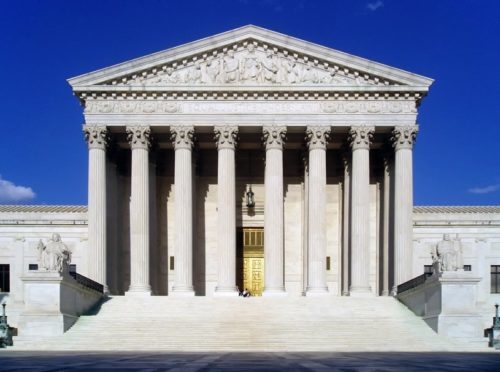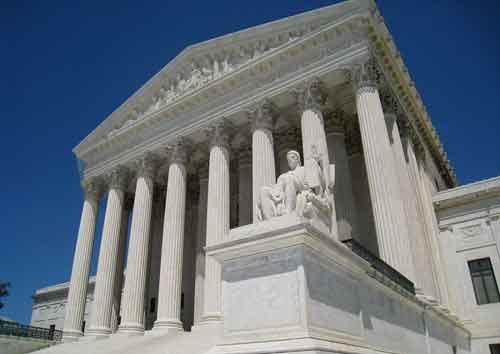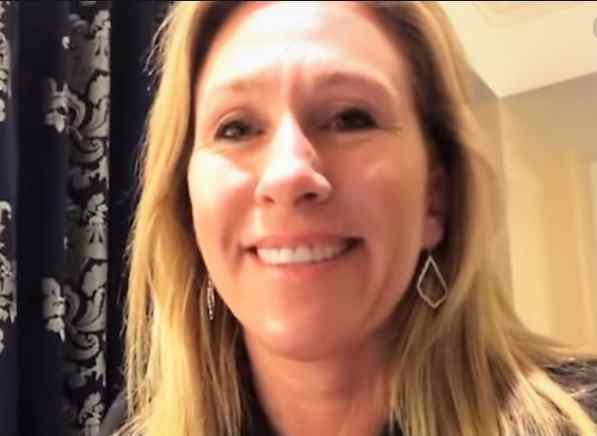The challengers say they have “reasonable suspicion that Rep. Cawthorn aided the insurrection, thereby disqualifying him from federal office.”
Citing U.S. Rep. Madison Cawthorn’s alleged participation in the January 6 coup attempt, a group of North Carolina voters on Monday submitted a legal challenge to prevent the Republican lawmaker from seeking reelection in 2022.
“Cawthorn has engaged in blatant acts of insurrection. He must be held accountable for his actions which have threatened our democracy.”
In a complaint filed with the North Carolina State Board of Elections, 11 voters—represented by a team of legal experts that includes attorneys from the advocacy group Free Speech For People and former justices of the state Supreme Court—argue that Cawthorn is ineligible for public office under Section Three of the Fourteenth Amendment to the U.S. Constitution, known as the Disqualification Clause.
“The coordinated and violent January 6 attack on the United States Capitol in an effort to prevent Congress from certifying the presidential vote was an insurrection against the United States,” Ron Fein, legal director of Free Speech For People, said in a statement. “The Constitution disqualifies from public office any elected officials who aided that insurrection.”
“As set forth in our complaint, the publicly available evidence, including Rep. Cawthorn’s own statements and reports that he or his office coordinated with the January 6 organizers, establish reasonable suspicion that Rep. Cawthorn aided the insurrection, thereby disqualifying him from federal office,” Fein added. “We look forward to asking him about his involvement under oath.”
Under the relevant North Carolina statute, any registered voter may challenge the candidacy of a person running in their district based on “reasonable suspicion or belief” that the candidate “does not meet the constitutional or statutory qualifications for the office.”
Once a challenge is filed, the burden of proof shifts to the candidate, who “must show by a preponderance of the evidence… that he or she is qualified to be a candidate for the office.” The statute authorizes “depositions prior to the hearing, if requested by the challenger,” and “subpoenas for witnesses or documents… including a subpoena of the candidate.”
Free Speech For People said that “the challengers intend to depose Cawthorn and members of his staff—something that the U.S. House January 6 Select Committee has not yet done.”
As James G. Exum, Jr., a former Chief Justice of the North Carolina Supreme Court who is assisting voters in their effort to disqualify Cawthorn, put it: “The purpose of the constitutional provision relied on by the challengers to Mr. Cawthorn’s candidacy is to prevent persons who sought illegally to overthrow a duly elected government from participating in running that government. The challengers believe the evidence will show Mr. Cawthorn to be one of those persons.”
The complaint says:
Challengers have reasonable suspicion that Rep. Cawthorn was involved in efforts to intimidate Congress and the vice president into rejecting valid electoral votes and subvert the essential constitutional function of an orderly and peaceful transition of power. Challengers have reasonable suspicion that Cawthorn was involved in either planning the attack on January 6, or alternatively the planning of the pre-attack demonstration and/or march on the Capitol with the advance knowledge that it was substantially likely to lead to the attack, and otherwise voluntarily aided the insurrection.
According to Free Speech For People:
In the weeks leading up to January 6, Cawthorn publicly urged his followers to threaten and intimidate members of Congress into blocking certification of 2020 election results. As the date approached, Cawthorn or his staff were in close contact with rally organizers. His speeches, tweets, and other public statements establish reasonable suspicion that he helped plan the demonstration and/or march with advance knowledge of the violent attack. Furthermore, his speeches since then suggest that he continues to endorse political violence as a tool for intimidation.
Section Three of the Fourteenth Amendment, passed not long after treasonous slaveholders were defeated in the Civil War, states that “No Person shall be a Senator or Representative in Congress… who, having previously taken an oath, as a member of Congress… to support the Constitution of the United States, shall have engaged in insurrection or rebellion against the same, or given aid or comfort to the enemies thereof.”[content id=”79272”]
The North Carolina voters’ petition to bar Cawthorn from seeking reelection under the Fourteenth Amendment’s Disqualification Clause is the first such challenge to a candidate’s eligibility since the Reconstruction era, according to Free Speech For People.
The advocacy group added that Gerard Magliocca, a professor at the Indiana University Robert H. McKinney School of Law and one of the nation’s leading experts on Section Three of the Fourteenth Amendment, is prepared to serve as an expert witness in support of the voters’ challenge.
The group explained next steps:
The challenge will first be heard by a multi-county panel to be appointed by the North Carolina State Board of Elections. After the hearing, the panel will issue written findings of fact and conclusions of law. Its decision can be appealed by either side to the State Board, and the State Board’s decision can be appealed to the North Carolina Court of Appeals.
While state election authorities cannot impose additional qualifications upon federal candidates, they can (as confirmed by then-Judge, now-Justice Neil Gorsuch) exclude candidates from the ballot who do not meet the qualifications established by the Constitution itself.
Cawthorn currently represents North Carolina’s 11th congressional district, but he has filed a notice of candidacy for the recently redrawn 13th district.
GOP gerrymandering in the state is so egregious, however, that the North Carolina Supreme Court in December ordered election officials to postpone the upcoming primary from March to May pending litigation challenging the redistricting. Free Speech For People noted that the redistricting lawsuit “may affect the timing of the hearing in the challenge to Cawthorn’s candidacy.”
“As an insurrectionist, he should not be on the ballot.”
John R. Wallace of Wallace & Nordan, a North Carolina law firm that specializes in election law and is helping to represent the voters, said that while “claiming to be fighting a battle for our Constitution, Cawthorn has engaged in blatant acts of insurrection.”
“He must be held accountable for his actions which have threatened our democracy,” Wallace added.
Robert F. Orr, a former Republican Justice of the North Carolina Supreme Court and member of the voters’ legal team, stressed that “this challenge is all about enforcing the Constitution of the United States.”
“The Constitution mandates that those who take the oath to support the Constitution and then violate that oath shall be disqualified from holding office,” said Orr, who called himself “privileged to participate… in this critically important effort to enforce that constitutional mandate and disqualify Madison Cawthorn from attempting to be elected to public office in 2022.”
As Common Dreams reported last week, Free Speech For People and Our Revolution—the political organizing group that emerged in the wake of Sen. Bernie Sanders’ (I-Vt.) 2016 presidential run—have teamed up to co-lead 14point3, a national campaign urging secretaries of state and chief election officials nationwide to invoke Section Three of the Fourteenth Amendment to keep everyone who participated in or aided and abetted last year’s deadly coup attempt, including Cawthorn and former President Donald Trump, off any future ballots.
Common Dream’s work is licensed under a Creative Commons Attribution-Share Alike 3.0 License. Feel free to republish and share widely.
[content id=”79272″]







